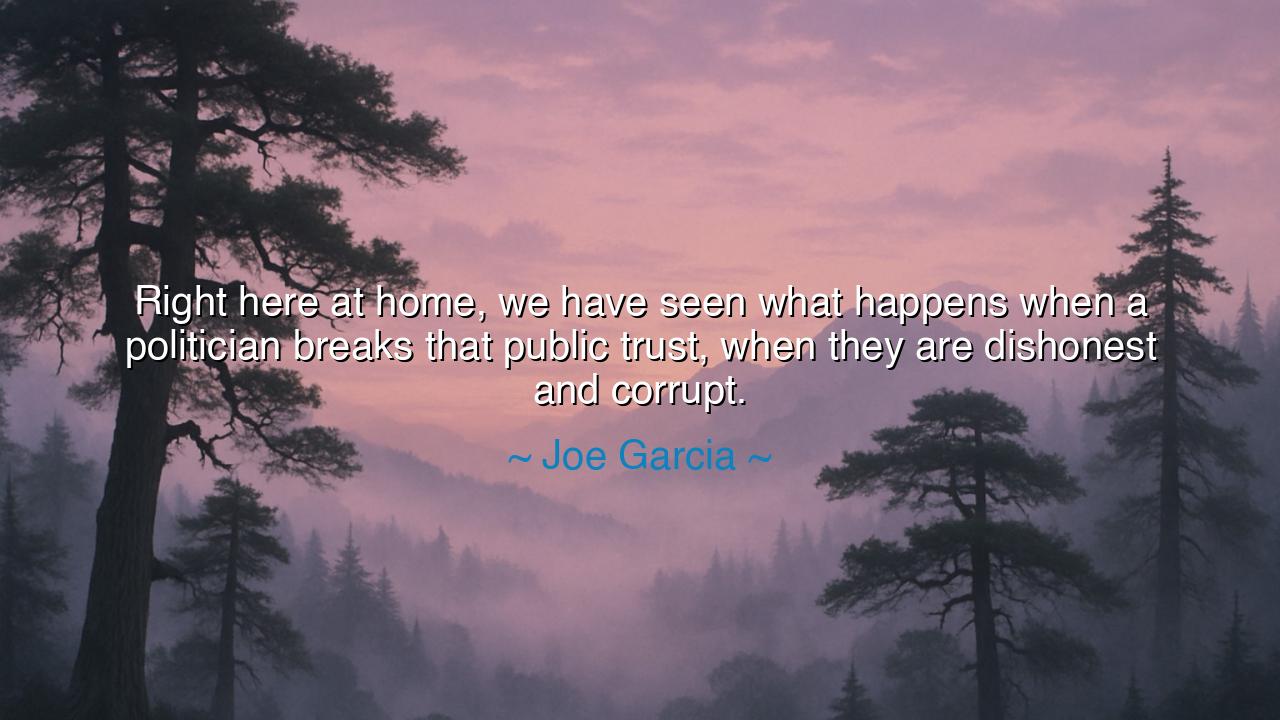
Right here at home, we have seen what happens when a politician
Right here at home, we have seen what happens when a politician breaks that public trust, when they are dishonest and corrupt.






“Right here at home, we have seen what happens when a politician breaks that public trust, when they are dishonest and corrupt.” Thus spoke Joe Garcia, and though his words were framed in the politics of his own time, they ring with the weight of eternal law. For there is no covenant more sacred in the affairs of nations than the bond between the governed and those who govern. When a leader shatters that bond, when dishonesty and corruption take root, the people do not merely lose faith in a man—they lose faith in the very pillars of their common life.
The meaning of this saying is clear: a politician does not rule by force alone, but by the invisible fabric of public trust. It is this trust that allows laws to be respected, that gives weight to decisions, that unites a people beneath one banner. When that trust is betrayed, when lies are spoken and justice is sold, the people become divided, cynical, and restless. The leader may imagine himself strong, but he stands upon sand, and the tide will sweep him away.
The ancients gave witness to this truth. Consider the fall of Rome, not by enemies at its gates, but by corruption within. Senators who sold their votes, emperors who plundered the treasury, officials who placed personal gain above the good of the republic—each crack widened until the mighty empire crumbled. Rome was not defeated by barbarian swords alone; it was defeated by the corruption of those who had broken the trust of their own citizens.
History speaks again in the story of Richard Nixon. When the scandal of Watergate was revealed, the issue was not merely the break-in, but the cover-up, the lies, the betrayal of the people’s confidence. For once a leader is caught in dishonesty, every word thereafter is suspect, every action doubted. The resignation of a president was not only the fall of a man, but a wound to the trust of a nation, teaching in painful clarity the truth of Garcia’s words.
And yet, there are also examples of leaders who guarded the public trust like sacred fire. George Washington, offered the chance to be king, laid it down and chose instead the humility of service. Abraham Lincoln, though surrounded by suspicion and hatred, spoke honestly and bore himself with integrity, preserving the soul of a nation through its darkest war. Their greatness endures not because they held power, but because they respected the covenant of trust between people and leader.
The lesson for us is twofold. For leaders, it is a commandment: protect the public trust above all, for once it is lost, nothing remains but ashes. For citizens, it is a warning: be vigilant, demand accountability, do not surrender your loyalty cheaply. Trust must be given carefully, and when broken, it must not be excused, lest corruption spread unchecked. A people that tolerates dishonesty will find themselves enslaved to it.
Therefore, children of tomorrow, carry this wisdom: honesty is the lifeblood of leadership, trust the foundation of nations. When leaders honor that trust, societies flourish in unity; when they betray it, societies decay into bitterness and ruin. Do not be deceived by smooth words or false promises—judge by integrity, measure by truth. And if you are ever entrusted with power, guard it as you would your own soul. For the people will remember not the wealth you amassed, but whether you were faithful to their trust.






NTDiem Huong Nguyen Thi
This quote highlights the destructive impact that dishonesty and corruption can have on public trust. But what happens when the system itself seems broken, and corruption is widespread? Can citizens still effectively demand change, or does the disillusionment just grow deeper? How do we create a political environment where honesty and integrity are valued above power and influence?
NGNobita Gaming
Garcia’s point about the consequences of a politician breaking public trust makes me think about the long-term effects. Can a country really move forward after such a betrayal, or does it leave scars that take generations to heal? What steps should be taken to ensure that public trust is protected, and what role do voters play in holding politicians accountable? Can the damage ever truly be undone?
HAA1-04-Nguyen Thi Hong An
I completely agree with Garcia. When a politician betrays the public trust, it’s not just about that individual, but about the entire political system. How do we hold politicians accountable for their dishonesty or corruption without it affecting our overall confidence in the system? Can we make meaningful reforms to prevent such actions, or are we just stuck in a cycle of broken trust?
BBBo Be
Joe Garcia's quote really resonates with me. When a politician breaks the public's trust through dishonesty or corruption, it undermines not only their own credibility but also the faith people have in the political system. But how do we, as citizens, rebuild that trust once it's been broken? Is it possible for politicians to regain the public’s confidence, or do these actions leave a permanent stain on their careers?